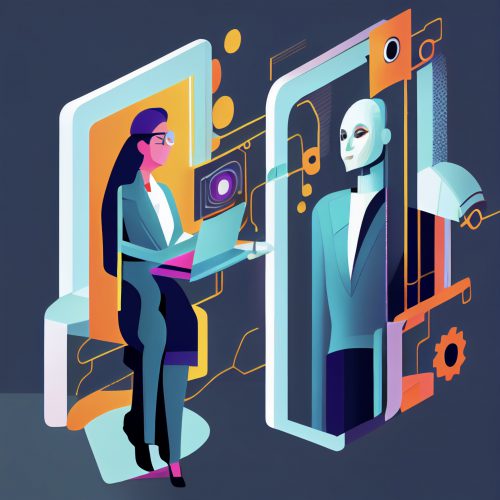How AI is Revolutionising the Recruitment Process
 The recruitment process has traditionally been a time-consuming and resource-intensive task for HR professionals and recruiters. Sorting through resumes, conducting interviews, and assessing candidates can take up a significant amount of time and energy, often resulting in delays and bottlenecks in the hiring process. However, with the rise of artificial intelligence (AI), there’s a growing potential to streamline and optimize the recruitment process.
The recruitment process has traditionally been a time-consuming and resource-intensive task for HR professionals and recruiters. Sorting through resumes, conducting interviews, and assessing candidates can take up a significant amount of time and energy, often resulting in delays and bottlenecks in the hiring process. However, with the rise of artificial intelligence (AI), there’s a growing potential to streamline and optimize the recruitment process.
AI-powered tools and algorithms can now assist in tasks such as candidate matching, resume screening, and even conducting initial interviews. By automating some of these processes, HR professionals and recruiters can free up time to focus on more high-level tasks, such as building relationships with candidates and improving the candidate experience. In this article, we’ll explore the ways in which AI is revolutionizing the recruitment process, from improving efficiency to reducing unconscious bias and enhancing candidate engagement.
Applications of AI in Recruitment
Artificial intelligence (AI) has the potential to transform the recruitment process in a variety of ways. By automating certain tasks and leveraging advanced algorithms, AI can help streamline the recruitment process, reduce errors, and improve the overall efficiency of the hiring process. In this section, we’ll explore some of the key applications of AI in recruitment, from resume screening to candidate matching and beyond.
We’ll take a closer look at how AI can help improve the recruitment process at every stage, including identifying potential candidates, screening resumes, and conducting initial interviews. We’ll also explore the benefits and limitations of AI in recruitment, and offer best practices for using AI tools effectively and efficiently. By the end of this section, you’ll have a better understanding of the different ways in which AI is transforming the recruitment process, and how you can use these tools to find the right talent for your organization.
Get started with Whoppit Today
Benefits and Limitations of Using AI in Recruitment
Artificial intelligence (AI) is rapidly transforming the recruitment process, offering a range of potential benefits such as increased efficiency, improved candidate matching, and reduced bias. However, like any new technology, there are also potential limitations and drawbacks to using AI in recruitment. In this section, we’ll explore the benefits and limitations of using AI in recruitment, and provide tips for using AI tools effectively and ethically.
We’ll begin by examining some of the key benefits of using AI in recruitment, such as automating routine tasks, improving candidate screening, and reducing unconscious bias in the hiring process. We’ll also explore some of the potential limitations of using AI in recruitment, such as the risk of introducing new biases, the cost of implementing and maintaining AI tools, and the limitations of machine learning algorithms.
In addition, we’ll offer practical tips for using AI tools effectively and responsibly in the recruitment process. This will include strategies for minimizing potential biases in AI algorithms, integrating AI tools with human decision-making, and measuring the effectiveness of AI tools in improving the recruitment process. By the end of this section, you’ll have a better understanding of the benefits and limitations of using AI in recruitment, and how to use these tools in a way that maximizes their potential while minimizing their drawbacks.
Maximizing the Potential of AI-Powered Recruitment Tools
Artificial intelligence (AI) has the potential to revolutionize the recruitment process, from automating routine tasks to improving candidate matching and reducing bias. However, to fully realize the potential of AI-powered recruitment tools, it’s important to use them effectively and ethically. In this section, we’ll explore best practices for maximizing the potential of AI-powered recruitment tools, including strategies for minimizing bias, integrating AI with human decision-making, and measuring the effectiveness of AI tools in the recruitment process.
We’ll start by discussing some of the key ways in which AI can help streamline and optimize the recruitment process, from identifying top talent to automating administrative tasks. We’ll then delve into the best practices for using AI-powered recruitment tools effectively, including how to ensure that AI algorithms are fair and unbiased, how to integrate AI with human decision-making, and how to measure the effectiveness of AI tools in improving the recruitment process. By the end of this section, you’ll have a better understanding of how to maximize the potential of AI-powered recruitment tools and use them to find the right talent for your organization.
Real-World Examples of AI in Recruitment
While the use of artificial intelligence (AI) in recruitment is still in its early stages, there are already many real-world examples of companies successfully using AI-powered recruitment tools to streamline and optimize their hiring processes. In this section, we’ll explore some of these examples, from how AI is helping companies to identify top talent more effectively to how it’s being used to reduce bias and improve candidate matching.
We’ll start by looking at how companies are using AI-powered tools to screen resumes and identify top candidates more effectively, including examples of how AI can help identify key skills and experiences that may be overlooked by human recruiters. We’ll then explore how AI can help reduce bias in the recruitment process, such as by removing identifying information from resumes or using language processing tools to identify and eliminate biased language. Finally, we’ll examine how companies are using AI-powered chatbots and virtual assistants to improve candidate engagement and provide a more personalized hiring experience.
By the end of this section, you’ll have a better understanding of the real-world applications of AI in recruitment, and how you can use these tools to find the right talent for your organization.
Future of Recruitment with AI
As artificial intelligence (AI) becomes increasingly integrated into the recruitment process, the future of recruitment is rapidly evolving. In this section, we’ll explore some of the ways in which AI is expected to transform the recruitment process in the coming years, from improving the candidate experience to enhancing predictive analytics and machine learning.
We’ll start by examining how AI-powered recruitment tools can help organizations create a more personalized and engaging candidate experience, such as through the use of chatbots and virtual assistants that can answer questions and guide candidates through the hiring process. We’ll then delve into the ways in which AI can help improve predictive analytics and machine learning in the recruitment process, such as by analyzing large datasets to identify patterns and predict which candidates are most likely to succeed in the role.
Finally, we’ll explore some of the ethical and legal considerations that organizations will need to keep in mind as AI becomes increasingly integrated into the recruitment process, such as ensuring that AI-powered tools are transparent and unbiased, and that candidates are aware of how their data is being used. By the end of this section, you’ll have a better understanding of the ways in which AI is expected to transform the recruitment process in the future, and the opportunities and challenges that lie ahead.
Artificial intelligence (AI) is transforming the recruitment process, offering a range of potential benefits such as increased efficiency, improved candidate matching, and reduced bias. In this article, we’ve explored some of the key ways in which AI is being used in recruitment, from automating routine tasks to enhancing predictive analytics and machine learning. We’ve also examined some of the potential benefits and limitations of using AI in recruitment, and offered best practices for using AI tools effectively and ethically.
As we’ve seen, the use of AI in recruitment is still in its early stages, and there are many opportunities and challenges that lie ahead. However, by keeping in mind the potential benefits and limitations of AI in recruitment, and using these tools effectively and ethically, organizations can improve their recruitment processes and find the right talent to help their businesses succeed.
We hope that this article has provided a useful overview of how AI is transforming the recruitment process, and has offered some practical guidance on how to use AI-powered recruitment tools effectively and ethically. By following these best practices and keeping an eye on the future of AI in recruitment, organizations can stay ahead of the curve and find the best talent for their needs.

